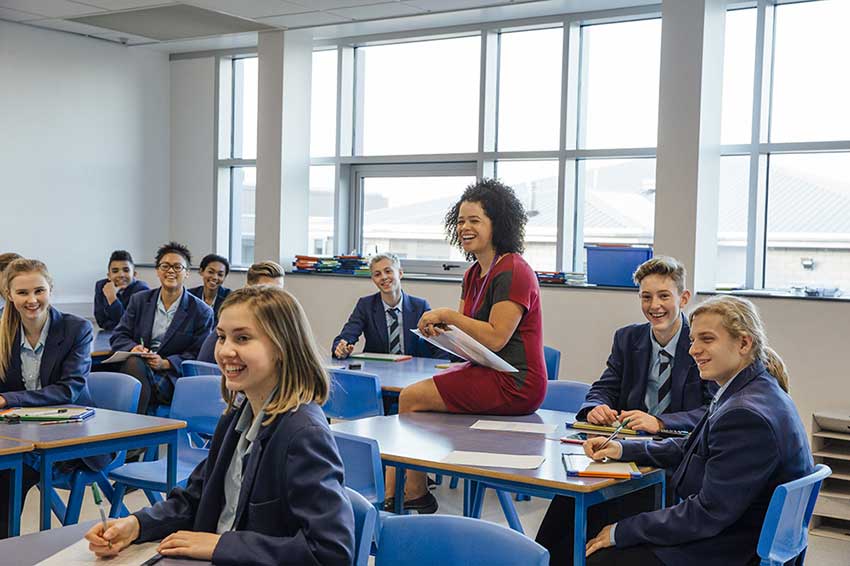How school competitions enhance learning and grow your students’ knowledge

Every newly-born generation holds the keys to our future, and as teachers, it’s our job to make sure they’re as clever as they can be. We pass on our knowledge of the world through the curriculum, everyday advice, and a method that isn’t traditionally associated with learning, but one that can give a solid boost to the education of your students: school competitions.
School competitions are about much more than just kudos. They can motivate students to succeed, help them get into quality universities, and most importantly, pose questions and tasks that are beyond the curriculum, and that help to solidify and enhance their knowledge.
Here are the key ways that school competitions can enhance learning for students, across each foundational subject: Literacy (English, Writing, Spelling Bee and STEM (Mathematics, Science and Digital Technologies)
They stimulate complex thought processes and encourage higher-order thinking
Competition questions can be complex, with a variety of thought processes usually needed to find the correct answer. For ICAS, our test developers use the Hess Cognitive Rigor Matrices (among others) to create our questions — a system that helps them to understand the various levels of abstract thinking and thought processes that are required to answer them. For the information in each question, students may need to analyse, make inferences and synthesise with their existing knowledge — higher-order thinking processes they may not usually practise, but which are invaluable for the adult world. This is true regardless of whether the questions are essay-style or selected response.
Why is higher-order thinking important? According to Victoria’s Department of Education: “It is easy to assume that students who appear to move through tasks quickly have all the skills they need. A teacher may also think these students have little more to develop. Yet, the development of cognitive and metacognitive skills has no ceiling. If students exceed curriculum level outcomes, tasks can be made more challenging by targeting higher-order thinking. This will set the conditions for students to extend their learning.”
Extra-curricular school competitions are the ideal means for challenging high-ability students. They encourage them to dig deep and apply the knowledge and skills they learn in the classroom to real-world scenarios, often in new and unexpected ways. Frank Catalano, principal at Glen Waverley Primary School in Victoria says of such competitions: “they really do allow the children to really think about themselves in the future.” And Andrew — a student from NSW who took part in Year 8 ICAS Science, says: “I sat the English, Maths and Science ICAS exams, and I thought the exams were really challenging and interesting, especially when they’re applicable to the real world.”
These types of competition questions can be so much more than just “show me what you know.” They are “show me how to apply what you know to new and unfamiliar situations,” which challenges students and even excites them.
School competitions help to improve teaching programs and strengthen students’ education
If the competition is well-designed, you will receive valuable aggregated results data that you can use to improve your lesson planning. For example, if the results for your cohort reveal that it performed lower than the national average for “interpreting graphs and tables,” you can plan extra lessons to strengthen the skill.
It’s much broader than individual skills too. You can reflect on all your learning programs and redesign them accordingly. When I taught Science to K-6 students and ran ICAS Science for Years 3 to 6, the results showed me where students were confident, where they needed more opportunities to learn, and where my own assessment writing practices needed to be refined to get students to think more deeply about the subject matter. Competition results can be an opportunity for everyone to improve and learn!
They solidify knowledge through revision and identify areas of improvement
While revision isn’t strictly necessary for a school competition, it’s encouraged if the student wants to get the best possible result. They may decide to read over their old notes, create flashcards, practise past papers, use exam practice platforms and more, all the while engaging with the subject matter. This helps to stimulate their memories, solidify the information in their brains and ultimately provide a deeper understanding of the subject matter.
Similarly, the results of a school competition can tell you which skill areas need to be improved. If the student is motivated, they can dedicate time to learning more about them and strengthening those skills and their knowledge in the process.
School competitions motivate students to learn
As you can see in sports across the world, competition itself can also be a powerful motivator. When introducing competition, I’ve seen students who are usually bored with certain subjects come to life, and this excitement and engagement carries over into the rest of their learning (at school or in life). They’re surprised at feeling excited about learning and satisfied after proving themselves capable — despite feeling daunted at first!
As teachers, we get surprised too. We may equate competition with the stress and anxiety of being compared to others, but for students who are willing to compete, even if they’re reluctant at first, they can be rewarded with a renewed thirst for learning and a drive towards excellence. It doesn’t matter if they fail, because school competitions aren’t really about that. They’re about helping to build the knowledge of your students and children, slowly transforming them into intelligent, capable adults. And let’s not forget Yoda’s infinite wisdom that “the greatest teacher, failure is.” The questions they get wrong can be addressed and corrected, but in a safe space without consequences. A lifelong love of learning is one of the most valuable gifts we can give to students and the next generation.
They build students’ confidence
Assessments can be intimidating, but the things that scare us are usually the things that help us grow. A school competition persuades students to sit down, focus and get the job done without the help of teachers or classmates. They may discover that they’re more capable than they think; not only able to handle the challenge before them, but ace it. This can help to build an incredible sense of confidence and self-esteem. They’re achieving something independently in a safe environment, where they’re encouraged to focus, pace themselves and get the job done — crucial skills that they will need as successful adults.
School competitions can help improve attention
In a world of endless distractions, most of us would like to focus a little better. It’s a necessary skill for success, and a study published in Frontiers in Psychology found that participants’ reaction times were faster — indicating increased attention — when they completed a task in a competitive environment. They seem to fortify our focus and drive us to succeed. Esther, who completed Year 8 ICAS English in NSW, says: “I love that ICAS tests have such a wide variety of questions and always keep me on my toes,”
School competitions encourage growth mindset
Growth mindset is the belief that you can grow your intelligence, rather than being born with fixed abilities. This belief allows students to see failures as opportunities to learn and grow, and this way of thinking is associated with greater achievement and happiness later in life.
Again, school competitions, like ICAS, allow them to fail in a safe environment. I often told my students that it was OK if you didn’t do so well in an exam; that there’s always a next time, and that it’s important to remember that, as Einstein said, “failure is success in progress.” You often learn your best lessons from failure, and this helps to encourage a valuable growth mindset in children.
If you’d like to boost your children’s progress with a school competition, you might consider ICAS — one of Australia’s original and most popular assessments, now available in multiple countries across the world. You can also learn about some of benefits of school competitions here.
Good luck to your students!
Tag:enhance learning



